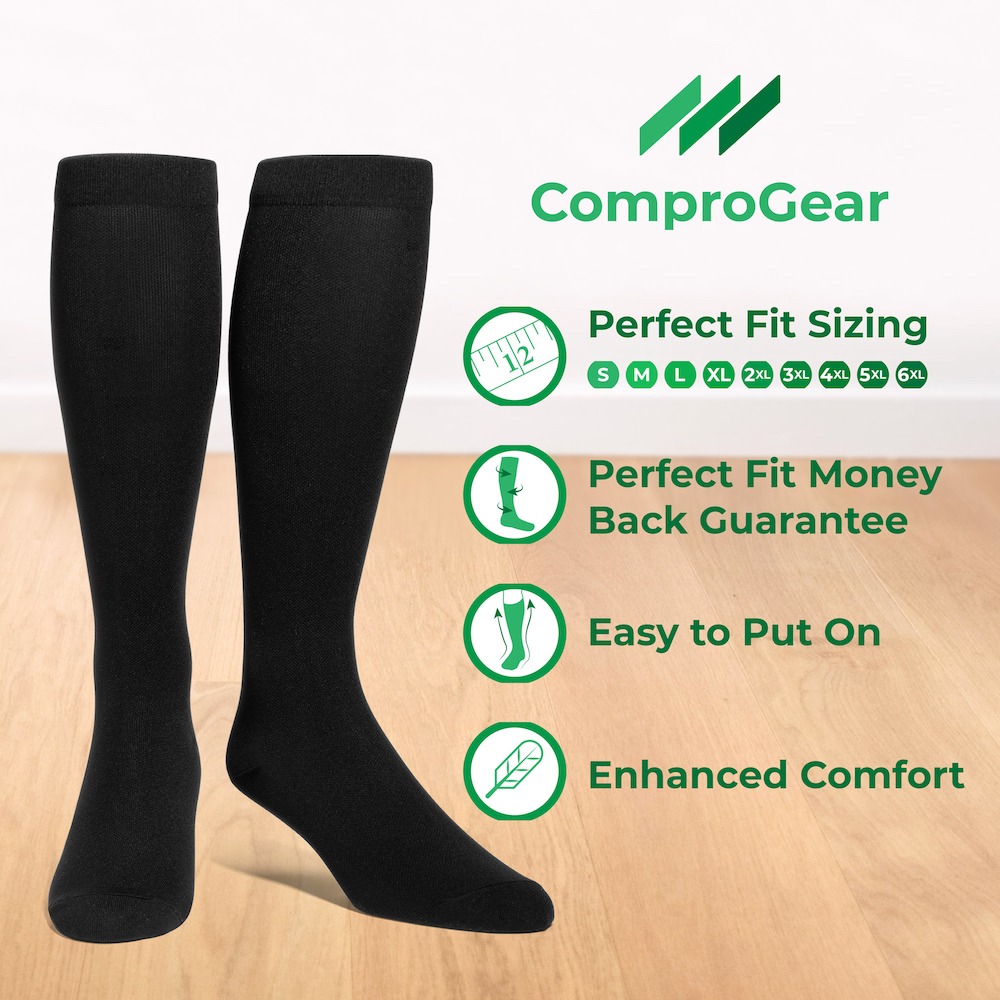The best Car Air Purifier should do the following:
– Be Ultra Low Noise
– Filter: Odors, Bacteria, Pollen, Allergens, Pet Dander, Dust, Smell, Smoke, Airborne Debris, Viruses, Toxic Pollution, Asthma Triggers, Mold
A car air purifier is exactly what it sounds like. It’s a device that filters out toxins in the air so you can breathe easy while in your car. They work in much the same way as regular room air purifiers.
Like regular room air purifiers, however, there is a wide spectrum of quality when it comes to car air purifiers.
Let’s talk about how to pick the right car air purifier for you.
Our #1 Recommendation
We recommend the Coconut Air CocoCube Car Air Purifier as our top car air purifier pick.
Benefits of Using a Car Air Purifier
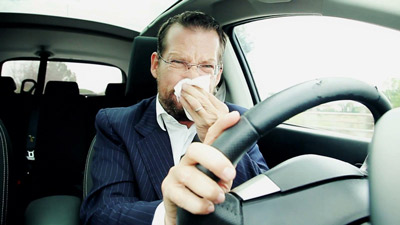
Do you spend a lot of time in your car?
The hours spent commuting and carpooling can add up quickly!
That’s where a car air purifier comes in.
It’s always important to breathe clean air (especially if you are prone to asthma or allergies).
For many people, it’s not just enough to filter the air in their home. Filtering the air in your car is just as important. This requires a car air purifier.
(The filter in your car’s air conditioning system is not a car air purifier. It’s only meant to filter the largest particles. A car air purifier should have at least a HEPA filter to filter 99.97% of all particle sizes.)
Breathing clean air has many benefits. A car air purifier can help prevent wheezing and chronic disease. A car air purifier can even improve your driving experience by eliminating unwanted odors. (But only if the specific car air purifier you use has activated carbon in addition to the HEPA filter.)
Types of Pollution that Can Enter Your Car
Maybe you’re thinking, “but how can my car air become polluted in the first place?”
Unfortunately, there are many ways.
Common pollutants include:
– Viruses (yes a HEPA filter will filter viruses)
– Bacteria
– Mold
– Smoke (in fact, smoke chambers are commonly used in marketing campaigns)
– Pet Dander
– Smell / Odors (filtered by activated carbon and it’s adsorption capability)
– Pollution
– Asthma Triggers (like airborne debris and smog)
– Many of the toxic gasses in car and diesel exhaust
These pollutants are small enough that they go right through your normal car air filter (if it even has one). Getting a dedicated car air purifier is the upgrade required to fully filter these.
These can be filtered by the HEPA filters and activated carbon beds of a car air purifier quite easily.
It’s just cheaper for auto manufacturers not to build a proper car air purifier. So they don’t.
Here are all the pollutants that a car air purifier can filter:
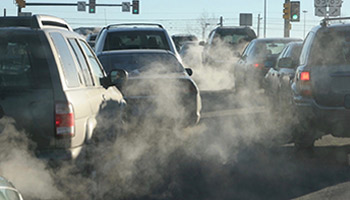
Smog and car fumes: Sitting in traffic? Live or work in the city? Chances are that the air quality, particularly on the highway, isn’t great. While it may seem like cars are sealed up from the outside world, there are many ways for the low-quality air to creep in.
Note: Many of the car fumes require deep bed activated carbon filters (thicker than 2 or 3 millimeters), a feature that most car air purifiers don’t offer.
Some fumes, like carbon monoxide, can’t be filtered, even with the thick 12.80mm activated carbon bed in the CocoCube Car Air Purifier. So it’s still a no-no on breathing in car exhaust.
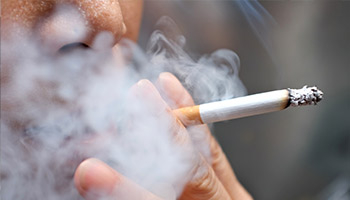
Cigarette smoke: Whether you smoke or a frequent carpool buddy does, you know that the cigarette smell lingers. Seriously. Even if someone smoked in your car one time, even if they smoked before getting into your car, you know it’s impossible to get rid of the smell. That is, unless you use a dedicated car air purifier. A car air purifier can actively filter smoke particles (~0.2 microns) using a HEPA filter. A car air purifier can also adsorb the smoke smell if it has a thick enough bed of activated carbon.

Wildfire smoke: Similar to the smog above, wildfire smoke can travel far and is terrible for the lungs. People hundreds of miles away can be affected. Keeping the windows up isn’t enough. You need to actively filter the particulates that get in using a car air purifier.
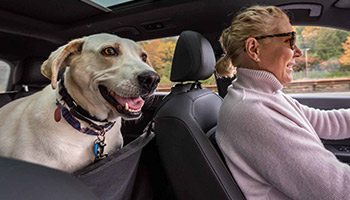
Pets: Whose dog doesn’t love going for a ride? Even a few cats enjoy a road trip now and then. Problem is the pet dander can cause serious allergies. Car air purifiers ensure that both of you enjoy the trip.

Allergens: If you have an allergy such as pollen, you already know the tiny spores have a bad habit of getting into the car. In extreme cases, eyes will can start watering and dangerously impairing your vision. A car air purifier can keep your hay fever at bay and keep you focused on the road.
A HEPA Filter can remove 99.97% of airborne contaminants ➡️ Bacteria, Viruses, Pollen, Allergens, Pet Dander, Dust, Smoke, Asthma Triggers, Mold, etc…
An Activated Carbon Filter can remove some gasseous contaminants ➡️ Smell, Some Vehicle Exhaust Pollutants, Some Toxic Outdoor Pollutants
Avoid ➡️ ozone generator, ion generator, anything tiny that plugs into your cigarette lighter, anything that uses “negative ions” in it’s marketing materials, any air purifier that says “no filters needed”
Be cautious of ➡️ UV lights (a UV light is unnecessary if there’s also a HEPA filter), thin activated carbon filters (activated carbon needs a certain thickness to be effective)
Our #1 Recommendation
We recommend the Coconut Air CocoCube Car Air Purifier as our top car air purifier pick.
Popular Articles on ComproGear
Super Plus Size Compression Stockings Bariatric Compression Leggings
Who Could Benefit from a Car Air Purifier

Car air purifiers, like regular home air purifiers, can help many people. In particular, this includes:
- People with allergies: Allergies are known to cause wheezing and sneezing. In the most severe cases, allergies can tighten your throat and block airways. Fortunately, avoiding this problem is easy when you have a car air purifier.
- People with asthma: Smoke – whether from natural sources or cigarettes – can irritate people with asthma. Again, filtering out these toxins with a car air purifier can prevent flareups.
- People with lung disease: Having lung disease can be frustrating because so many things can give you a cough or a feeling of tightness in the chest. Car air purifiers can help filter out most of the common culprits.
- Children: Children have smaller lungs than adults and are more susceptible to toxins in the air.
Even if you are lucky enough not to have limited lung capacity or one of the conditions above, air purifiers can still make the air smell fresh and clean.
This is why we recommend a car air purifier with both a HEPA filter and activated carbon. The HEPA filter traps particulates (up to 99.97% filtration) and the activated carbon filter helps adsorb smells and toxic gases.
The activated carbon is especially helpful, and can make long and stuffy car rides much more bearable.
Other groups who might benefit from a car air purifier include:
- People who drive for a living (Truck Drivers)
- People with long commutes (Commuters)
- Ride-sharing workers and taxi drivers (Uber / Lyft Drivers)
- Parents of busy children
- People who travel regularly in their vehicles (Road Warriors)
- People with pets
- People who live in cities
- People who have a smoker in the family
If you think a home air purifier is important, then you should seriously consider a car air purifier for all the same reasons.

Types of Car Air Purifiers
Like regular home air purifiers, car air purifiers are essentially in two categories:
1. Particulate Filters: These are pleated media that capture particulate. The most common type of these is a HEPA filter. This stands for High Efficiency Particulate Arrestance. These filters capture 99.97% or more of all particles passing through.
Technically HEPA filters (like those used in the best car air purifiers) capture “99.97% of particles whose diameter is equal to 0.3 μm, with the filtration efficiency increasing for particle diameters both less than and greater than 0.3 μm” (American Society of Mechanical Engineers, ASME AG-1a–2004)
This includes particles like allergens, bacteria, pollen, pet dander, asthma triggers, viruses, dust, wildfire smoke, tobacco smoke, and any particulate portion of air pollution.
2. Adsorbing Media: The best car air purifiers also contain an activated carbon filter (sometimes called a “Charcoal Filter”). Activated carbon works by adsorbing gaseous particles at the molecular level (adsorbing with a “D” not absorbing with a “B”). This includes harmful gasses, toxins, and smells.
3. Another HEPA Filter: No other car air purifier does this except the CocoCube Car Air Purifier. The CocoCube Car Air Purifier has a 2nd HEPA Filter to capture any dust particles that come from the activated carbon bed.
Most car air purifiers don’t have a filter after the carbon layer. Is a 2nd HEPA filter really necessary?
Just take a look at this picture of a particulate filter located after an activated carbon filter. The filter below used to be white. All that black stuff you see mottled into the filter is carbon dust. Do you want that in your lungs? (No. Me either. That’s why there’s a 2nd HEPA Filter on the CocoCube Car Air Purifier.)
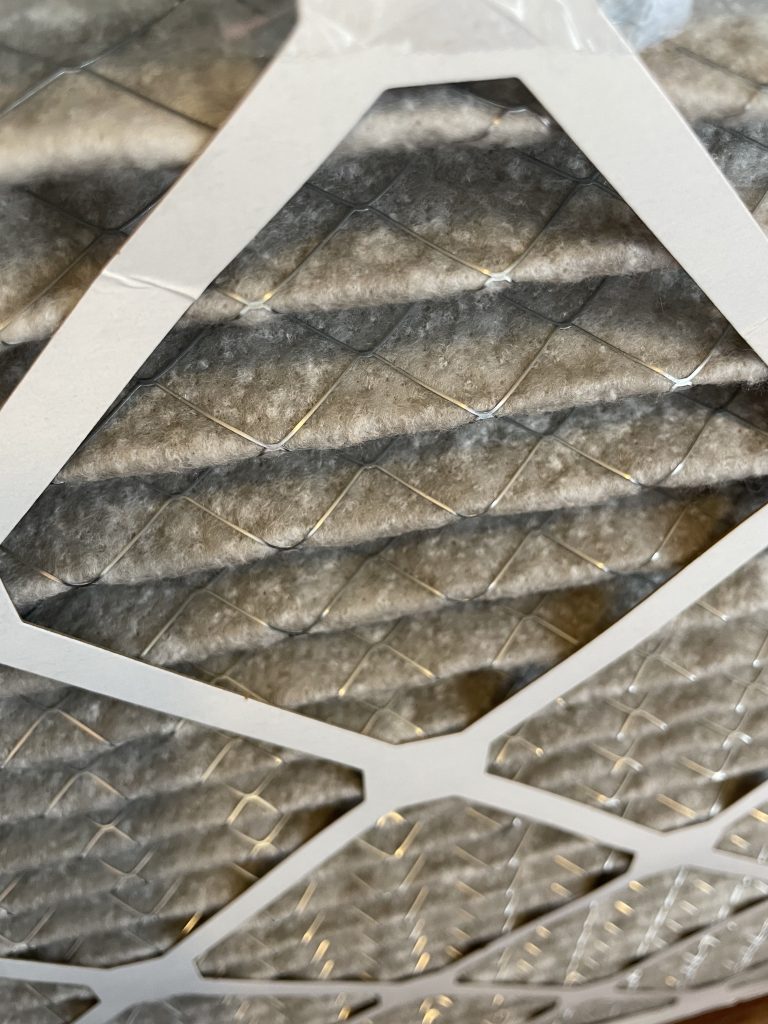
Stuff You Almost Certainly Don’t Want or Need
UV Filters – Yes, UV lights can kill viruses and bacteria. But only if the dwell time is long enough. This means keeping the air in close proximity to the UV light long enough to kill the viruses or bacteria. In clinical settings the UV lights are several feet long and located in air ducts. You can’t accomplish this with tiny car air purifiers. Besides, if you’re capturing all the particulate matter with a HEPA filter, you don’t need a UV light to kill anything. It’s already captured and taken car of. In the context of car air purifiers, UV lights are pure marketing hype.
Ozonators – You do NOT want to be breathing in ozone. According to the Iowa DNR “Breathing ground-level ozone can trigger a variety of health problems including chest pain, coughing, throat irritation, and congestion. It can worsen bronchitis, emphysema, and asthma. Ozone also can reduce lung function and inflame the lining of the lungs. Repeated exposure may permanently scar lung tissue.“
Tiny Cigarette Lighter Air Purifiers – These don’t actually purify the air. These so called “Ionic Air Purifiers” simply electrify air passing through them in the hopes that the air molecules will bind together and dust will fall out of the air faster. Do you want dust to stick to the inside of your car interior, or do you want it gone? Ignore the marketing hype about “creating millions of negative ions to stop odors and purify your car without filter changes or maintenance”. These don’t work. Some of them create ozone too. But most aren’t powerful enough to even do that. Ionic air purifiers just don’t work.
Features to Look for in a Car Air Purifier
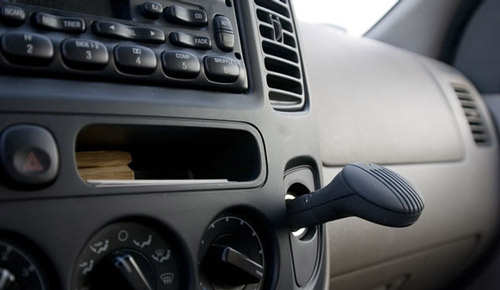
There are many things to look for in a car air purifier:
- Cost: Let’s face it, we often decide which items to get based on what’s the cheapest. With car air purifiers, however, it’s important to balance cost with…
- Quality: If you buy something that is cheaply made, it either won’t work or will break after a few uses. This means you will be out buying a new car air purifier again and spending more money than you would have had you just bought a better car air purifier to begin with. Make sure to buy the highest-quality air purifier you can afford. Remember, though, that expensive does not always equal high-quality.
- Filter Type: Do you just want to eliminate odors or do you want to eliminate toxins? Some air purifiers do both, such as ones that have both activated charcoal and HEPA filters. But the car air purifier needs an activated carbon bed that’s more than just a light dusting after the HEPA filter.
- Power Source: We suggest a plug in model without a battery. Batteries degrade over time and we forget to charge them.
- Noise: Getting rid of one distraction – polluted air – can sometimes introduce a new problem, namely loud noise. Try to get a quieter air purifier that won’t be a new distraction.
Other Considerations Before Buying a Car Air Purifier
Before buying a car air purifier, please make sure to read reviews.
But at the same point, don’t think reviews are everything. A lot of these chinese air purifier companies are paying people to give positive reviews. It’s against the Amazon rules, but as long as they don’t get caught, they don’t care.
Recommended Car Air Purifier
Our recommended car air purifier is the Coconut Air CocoCube Car Air Purifier.
The CocoCube filters out small particles with 2x HEPA filters (bacteria, viruses, mold, dust, smoke, pet dander, etc…)
It also eliminates odors and toxins with 12.80mm of activated charcoal. The activated carbon is potassium permanganate impregnated to target many of the toxins created by car/diesel exhaust.
It’s also small, silent, and plugs into a standard USB port (any rectangular USB-A port).
Tips and Advice
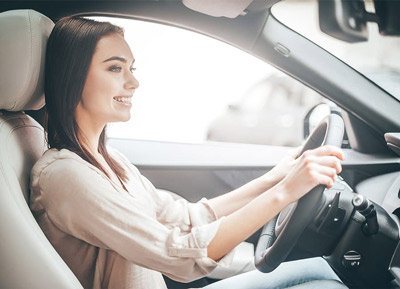
- Do you have more than one vehicle you use regularly? Get a car air purifier for both. If one of the vehicles isn’t yours (such as if you carpool) consider politely gifting it to the owner. If you have kids who regularly ride around with a babysitter or grandma, make sure you get one for their car too! Kids, after all, do have smaller lung capacities.
- Make sure to charge your purifier regularly if it runs on a rechargeable battery. If it runs on a cigarette lighter, make sure to charge your phone in advance so you don’t need to unplug one device to charge another.
- Think about where the purifier will go. Will in be in reach of your kids? Will it take up one of your precious cup holders?
- Remember that air purifiers will work best when you have the windows up. Keeping the windows down will invite pollutants into your car faster than any filter can eliminate them.
FAQs
- What happens if filters aren’t changed?
Pleated filters like HEPA filters slowly build up dust and debris. As this happens, resistance builds up (“increased pressure drop across the filter”) and less air flows through the filters. Eventually the filter becomes a wall of dust and no air can flow through. Activated carbon also fills up and needs to be changed. But since this happens on the molecular level, you know the activated carbon is full when odors start getting through (called “breakthrough” in discussions of gas masks or respirators that use activated carbon). - Can car air filters withstand the heat in a parked car?
This depends on the quality of the specific car air purifier. There are so many different brands like the IQair Atem, Nuvomed, GoPure, and Phillips. Then there are literally thousands of cheaply made chinese air purifiers sold on Amazon. The model we recommend, the CocoCube Car Air Purifier, is specifically designed to withstand at least the highest ever recorded interior car temperature. That’s why it’s backed up with a lifetime warranty. - Can car air filters work in the winter?
Of course! Some allergens (like pollen) decrease in the winter. Others (car fumes, smog, cigarette smoke, and pet dander) remain or even increase in the winter. - Does car air filters work against viruses?
Yes. A HEPA filter captures 99.97% or more of all particles. But this only applies to air that has passed through the car air purifier. Does this mean you can ditch the masks? Probably not. But, a HEPA filter will filter out particles that carry virus droplets and keep the air circulating. HEPA filter + mask is better than a mask alone. - If my car has a cabin air filter, do I still need an air purifier?
Yes. A cabin air filter is designed with the cheapest filter possible that will protect the car’s blower motor from large particles. A cabin air filter does not filter small particles that cause problems in your lungs. Air filter designers call these car filters “boulder catchers”. A dedicated car air purifier will have a HEPA filter that captures all particle sizes. - Will a car air filter drain my car battery?
Again, this depends on the type of air filter you get. If you get a filter that charges with a cigarette lighter and leave it plugged in and on while your out, it can drain your battery. The CocoCube Car Air Purifier we recommend uses such low energy fans that you would have to leave your car parked and turned off for weeks with the air purifier plugged into a powered USB outlet for it to drain the battery. It’s designed to be left plugged in all the time. Not all brands of car air purifier work this way.
Choosing an auto air purifier is as important as choosing a home air purifier
If 2020 taught us anything, it’s that we need to take care of our health. Improving our indoor air quality is one easy way to do this!
2020 also taught us that filtering small particles is extremely important.
(Small particles like bacteria, pollen, dust, pet dander, mold, and oh yea, viruses. Who can forget viruses.)
All this can be accomplished with a simple HEPA filter.
Adding an air purifier to your car, especially if you spend a lot of time there, can improve your air quality significantly.
We recommend the CocoCube Car Air Purifier.
Why the CocoCube Car Air Purifier?
– 2x HEPA Air Purifiers (Filters 99.9% of all particulate matter)
– 12.80mm Activated Carbon Air Purifier (Filters odors and many toxic vehicle exhaust gasses)
– Silent operation
– Plugs into a standard USB-A outlet (those rectangular USB outlets we use for everything)
If you’re interested, the CocoCube Car Air Purifier is now available at Amazon.com here.


